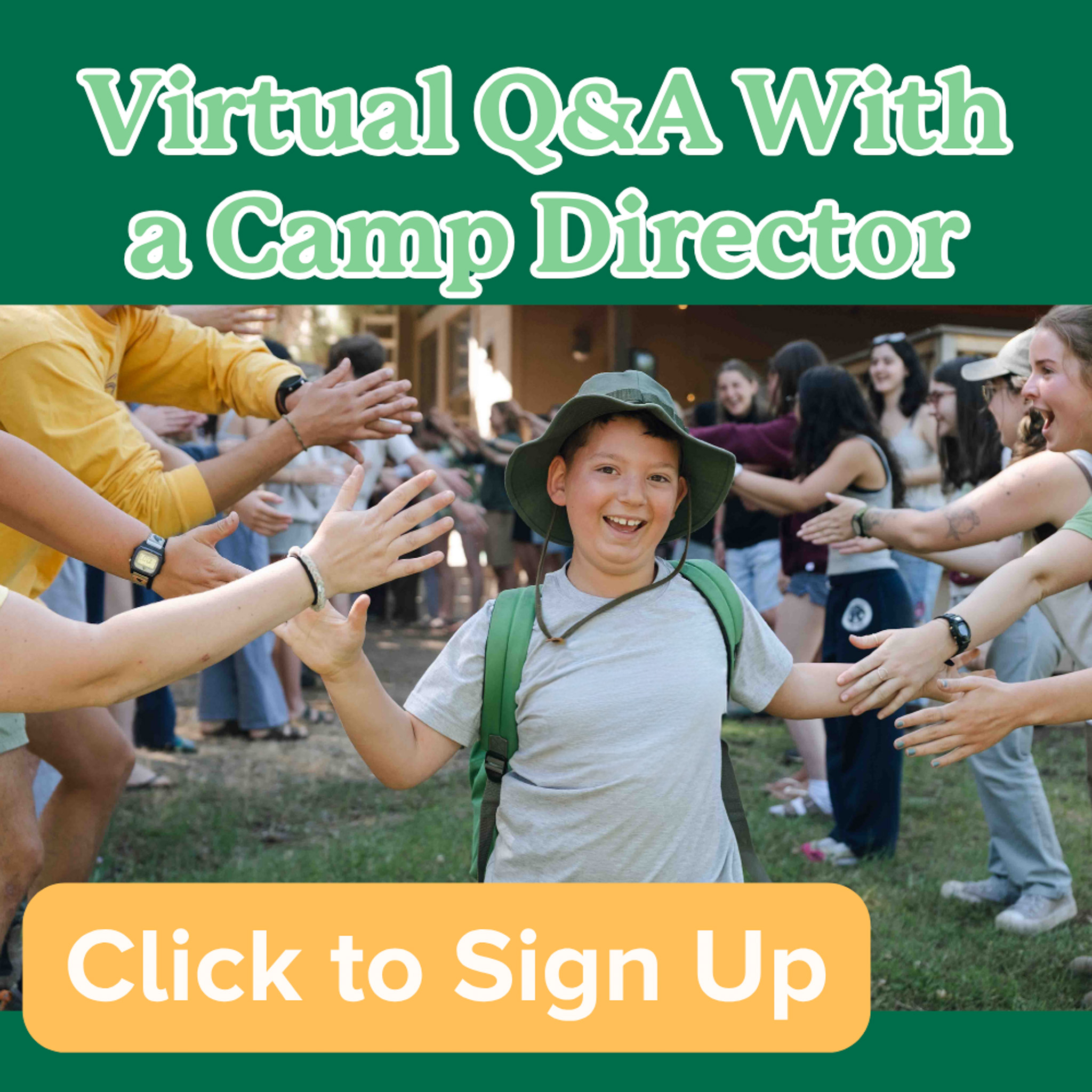Preparing Nervous or First-Time Campers
Six Tips to Prepare Your Child for Camp
Attending Camp can be a big step for any child to take. The anticipation can bring up a variety of emotions. Below are some tips for parents to help first-time or nervous campers prepare for Camp. We hope to make the summer a positive experience that your child will enjoy and remember for a lifetime!
❤️ 1) Be Sure to Tell Your Child…
You’re going to make a friend within the first 24 hours of Camp, and your counselors are there to help you.
- Tawonga has hired warm and loving staff to take care of your children. All counselors are at least 18 years old, have prior childcare experience and most have at least one year of college under their belt. Camp Tawonga counselors go through a week-long training which prepares them to handle any situation that might arise. Every counselor is looking out for the well-being of every single child, which includes making sure everyone is making friends.
I want you to have so much fun at Camp, and I know you are going to love it!
- Positive encouragement from a parent is key to a child’s success.
- Kids are very perceptive and can easily pick up on their parents’ concerns and anxiety. If your child is worried that their absence from home is going to be difficult for you, it will be much harder for them to enjoy Camp because they will be concerned about you.
- Kids also emulate how their parents feel. If they are getting positive energy from you about Camp, they will feel positively about their experience.
It’s okay to miss me, and know that I am going to miss you too – but you’re still going to have fun at Camp.
- It will help your child to know that missing each other is normal, and explaining this will help validate their feelings and reassure them.
🚫 2) Please Do NOT Say…
Don’t worry – you can call me any time.
- We have found that phone communication between campers and family members often prolongs homesickness. Also, kids who make it through their session without speaking with parents at home truly feel that they have accomplished something, which helps fulfill a tenet of the Tawonga mission: fostering positive self-image and self-esteem.
Just try it for a week (or a few days), and if it doesn’t work out, I will come and get you.
- The best way to set kids up for success is to let them know they will be staying at Camp for the entire time, and that they are going to do great! If a child goes in with the attitude of, “If I don’t like it, my parents will pick me up,” then they are much less likely to fully commit to the experience.
You need to go to Camp because I/we need a vacation.
- This reason (though there may be some truth to it!) misses the point that Camp will be a fun, growing, and positive experience for your child.
🛌🏽 3) Walk Them Through What to Expect
Contextualize the length of a session.
- Tawonga sessions begin on a Sunday, so on a Sunday at home, share with your child that this would be the first day of Camp. Then check in with them periodically throughout the week(s) until you have reached the same amount of time of your child’s session to help contextualize how long five days (or two or three weeks) feels.
Get used to a new sleeping set-up.
- Get your child comfortable with sleeping in a sleeping bag (or other Camp bedding) for a night or two before their session.
Prepare for family style meals.
- Read through our food & nutrition webpage to get familiar with food at Tawonga. Campers will enjoy family style meals at a table with their bunk in our dining hall. Remind them to always ask for help if they are having trouble finding something to eat! We prepare and serve alternative options at every meal for campers with food allergies, restrictions, and preferences. At each meal, campers can also find alternative food options at a salad bar in addition to a “middle table” with foods like bread, sun butter and jelly, hummus, tuna fish, plain pasta, etc.
Read through Tawonga’s Screen-Free Policy.
- Help your child understand that Camp is a wonderful opportunity to unplug. The transition away from screens can feel really challenging (for children and adults alike)! Encourage your child to pack a few non-digital items they love like books, stationary, or card games that they can use during down time. You could also try decreasing screen time at home in the weeks leading up to Camp so they can get comfortable with unplugging.
Review what a day at Camp will feel like.
- Read through our Daily Schedule webpage together to get familiar with Tawonga’s schedule and activities. Our activities include swimming at the river, tie-dye at arts & crafts, sports, making food in the garden, and so much more.
Prepare for a group-centered cabin experience.
- Your child will get to be part of a positive and cooperative bunk community! Read through our Cabin Life webpage together to learn about our group-centered philosophy.
🚿 4) Practice Skills They Will Use at Camp
- Encourage your child to practice things by themselves such as making a sandwich, taking a shower, applying sunscreen, getting dressed, and brushing/combing hair.
- When it’s time to get ready for bed, imagine they are at Camp! Have them go to the bathroom, brush their teeth, wash their face, put clothes from the day into their hamper (remind them that certain items such as sweatshirts can be worn a few times before washing), and put on their pajamas without any help.
- Encourage your child to practice self-advocating for their needs. Remind them that they can always ask for help whenever they need assistance.
- Pack for Camp with your child. Let them know where everything in their suitcase or duffel bag is placed. You might think it’s intuitive to put socks and underwear in the side pocket of their duffel bag, but your child might not know that pocket even exists!
📹 5) Attend a New Family Orientation
Virtual New Family Orientations provide an opportunity to meet with Tawonga directors and get your questions answered. All sessions are geared towards parents/guardians but campers are welcome to join. Visit tawonga.org/info-sessions-orientations to RSVP starting in the spring.
Recordings will be shared afterwards in case you’re unable to join.
👭🏽 6) Set Up a Playdate
You will gain access to your child’s session roster in your CampInTouch account and Campanion app in the spring. This is a great time to reach out to other families in your area to set up some playdates so your child sees some familiar faces at the bus stop. You’ll also have the opportunity to join an optional session-specific Facebook group. This is also a great way to connect with other parents in your child’s session to set up get-togethers and ask questions. If you would like further support in setting up a playdate, email [email protected] and we will help connect you with another family.
Questions?
We hope these tips are useful for you.
If you have any questions during your child’s stay at Camp, you can always email [email protected] or call the Camp office in San Francisco at 415.543.2267. Our office is open Monday through Friday from 9am-5pm, and our staff members check messages periodically over the weekends during the summer.
Ashley Costello and Shoshie Flagg are Tawonga’s Directors of Camper Care and Family Engagement, whose roles ensure our families are well taken care of. As parent liaisons, it is their goal to provide the best possible customer service, communication, and support to Tawonga parents. They’re happy to help brainstorm ways to prepare your child for Tawonga. Ashley lives at Camp during the summer and supports campers directly; Shoshie is Tawonga’s lead support for parents and is in close touch with the at-Camp summer team. If you’d like to reach them, please email [email protected] or [email protected].
Here’s to a beautiful summer in the Sierra Mountains!



